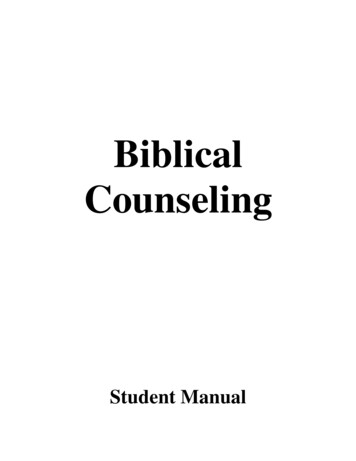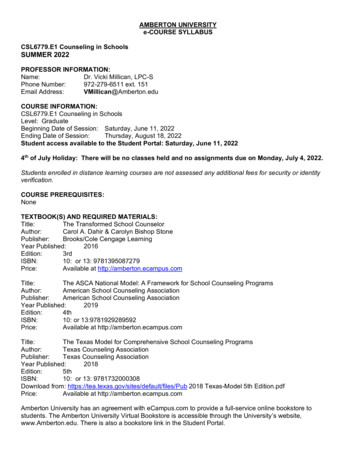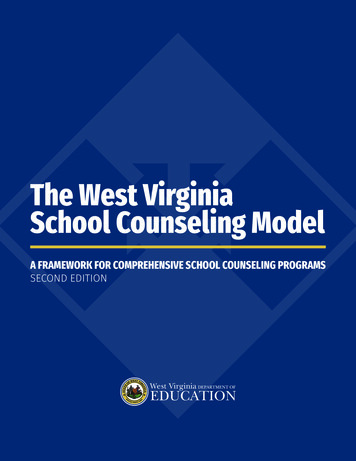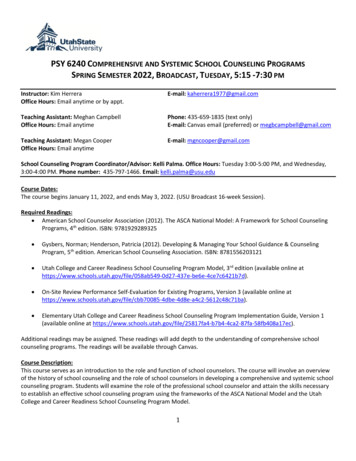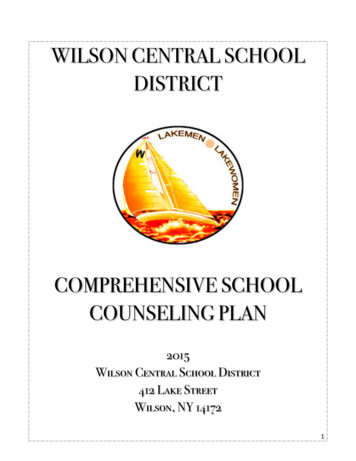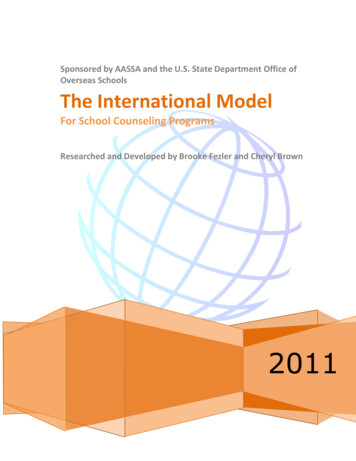
Transcription
Sponsored by AASSA and the U.S. State Department Office ofOverseas SchoolsThe International ModelFor School Counseling ProgramsResearched and Developed by Brooke Fezler and Cheryl Brown2011
International Model for School Counseling ProgramsTable of ContentsFOREWORD . 3ABOUT THE DEVELOPERS . 4A NEW BEGINNING FOR INTERNATIONAL SCHOOL COUNSELORS . 5INTRODUCTION . 6I. WHAT IS AN INTERNATIONAL SCHOOL COUNSELING PROGRAMWHAT IS AN INTERNATIONAL SCHOOL COUNSELING PROGRAM . 11A COOPERATIVE EFFORT . 15II.ELEMENTS OF THE INTERNATIONAL MODELELEMENTS OF THE INTERNATIONAL MODEL. 17. 20QUALITIES FOR AN INTERNATIONAL SCHOOL COUNSELORIII.FOUNDATIONBELIEFS . 22ASSUMPTIONS. 23PHILOSOPHY . 23MISSION STATEMENT . 26INTERNATIONAL STANDARDS (AN INTRODUCTION) . 27IV.DELIVERY SYSTEMINDIVIDUAL STUDENT PLANNING . 30RESPONSIVE SERVICES . 31SYSTEM SUPPORT. 32GUIDANCE CURRICULUM . 35. 36Academic Domain . 36Career Domain . 38Personal/Social Domain . 40Global Perspective Domain . 42INTERNATIONAL CONTENT STANDARDSV.MANAGEMENT SYSTEMMANAGEMENT AGREEMENTS . 50ADVISORY COUNCIL . 51. 53. 56STUDENT SUCCESS (CLOSING THE GAP) . 57ACTION PLANS . 58USE OF TIME . 60RECOMMENDED COUNSELING ACTIVITIES . 61CALENDARS . 62USE OF DATADATA MANAGEMENTVI. ACCOUNTABILITYRESULTS DATA . 65INTERNATIONAL SCHOOL COUNSELOR PERFORMANCE STANDARDS . 66PROGRAM AUDIT . 71GLOSSARY . 88REFERENCES . 93(Fezler/Brown, July 2011)2
International Model for School Counseling ProgramsForewordThis project is the first of its kind for the international school counseling profession. We set out toinvolve as many international school counselors and experts in the field as we developed this document.The First Edition of the International Model for School Counseling Programs is being offered tointerested parties for no fee at the following website: www.aassa.com. As with any publication,improvements to the original can and will be made. We encourage you to contact us with yourquestions and comments. Additionally, we look forward to hearing from you on your experience inimplementing the International Model at your school.Emails can be sent to: internationalschoolcounselor@gmail.com or you can find us atwww.iscainfo.org.Published and Released by Brooke Fezler and Cheryl Brown through the Association of American Schoolsin South America (AASSA) and U.S. State Department Office of Overseas Schools, July 2011. First Edition.The International Model for School Counseling Programs is based on the ASCA National Model: AFramework for School Counseling Programs (R) and is developed with permission by the AmericanSchool Counselor Association.(Fezler/Brown, July 2011)3
International Model for School Counseling ProgramsAbout the DevelopersBrooke Fezler (M.A. Counseling) has been aninternational school counselor since 2005 inIndonesia and Argentina; before moving abroad, sheworked in the San Francisco bay area, first inmarketing for companies including eBay, Saturn,and AT&T, and then as a public school counselor.She received her Master’s degree in Counselingfrom St. Mary’s College. Her thesis, titled “The needfor school counselor evaluations in an era ofeducational accountability” provided a springboardfor exploring ways for counselors to be activeparticipants in building their profession. Brooke hascoordinated school-wide movements towards theimplementationofcomprehensiveschoolcounseling programs. She has been a co-lead on theinitiative for designing an international schoolcounseling model, which is created in partnershipwith the American School Counselor Association(ASCA) and designed by hundreds of internationalschool counselors and designed for the uniqueneeds of international school students. This projectis supported by the U. S. State Department Office ofOverseas Schools and the Association of AmericanSchools in South America. She is co-leading thecreation of the International School CounselorsAssociation.Cheryl Brown (M.A. International Affairs and FrenchStudies, Certified Teacher) has been an internationaleducator since 1997 and has worked in internationalschools for twelve years, with seven years’ experience inhigh school counseling in Pakistan, England, Indonesia,and China.In Fall 2011 she will be working at theAmerican School of Warsaw in Poland. Cheryl has awealth of experience in planning, creating, and managingvarious projects. Most recently Cheryl coordinated theinitial efforts of her school’s K-12 counseling departmentin implementing a comprehensive counseling program.Additionally, Cheryl has experience in working with NGOs,multi-national and government-related organizationsaround the world. She has co-designed and implementedpolicy to improve and maintain the educational programsand has been involved in the complete cycle of postsecondary accreditation process and standards. Cherylmaintains a large international network with educationalinstitutions around the world. Partnering with BrookeFezler, Cheryl has been co-leading the development ofthe International Model for School Counseling Programs,which is based on the American School CounselorAssociation (ASCA) National Model. Brooke and Cherylhave presented at conferences around the worldencouraging international school counselors to dialogueand participate in the development of InternationalModel. Currently, Cheryl and Brooke are co-leading thecreation of the International School CounselorsAssociation.(Fezler/Brown, July 2011)4
International Model for School Counseling ProgramsA New Beginning for International School CounselorsBy Judy Bowers, Ed.D. Co-author of the “American School Counselor Association National Model forSchool Counseling Programs” and school counselor consultant.The International Model for School Counseling Programs will serve as a framework for school counselorsin International Schools to establish quality school counseling programs that show results. Often schoolcounselors establish their own programs based on the needs of the school and parents in their schoolwith counselors doing random acts of guidance. When counselors react to the immediate school needs,frequently only a small group of students are served. In the International School Counseling Model, allstudents are served when the counselors teach classroom lessons based on National competencies inthe academic, career, personal/social, and global perspective domains.The program shows school counselors how to keep data based on the competencies taught and theresults attained. Research of a results-based approach to school counseling has shown to contribute toacademic achievement. School counselors in the 21st century internationally will learn to access,analyze, interpret, and display data from their schools to show results. Yearly school counseling auditswill be compared to show how the international programs are making a difference.Through the leadership of Brooke Fezler and Cheryl Brown, the International Model was created anddeveloped with feedback from international school counselors at conferences around the world wherecounselors worked in task groups and committees to discuss and review the ASCA National Model. Itwas impressive to see the concentration and interest the groups had in providing suggestions for theInternational Model for School Counseling Programs.(Fezler/Brown, July 2011)5
International Model for School Counseling ProgramsIntroductionThe aim of the International Model for School Counseling Programs is to provide a framework forencouraging and promoting best practices among international school counselors. By creating “Unityfrom Diversity” for international school counseling programs, the International Model will guide theformation, review, and improvement of counseling programs at schools all over the world.The goals of the International Model for School Counseling Programs are to: Consolidate best practices to develop a comprehensive and preventative International Modelfor school counseling programs. Produce an effective model that is replicable across international schools--guiding counselors inwhat to do. Provide a common language and vision for international school counselors to continueconversations and professional learning among the diverse international school counselorgroup. Clarify the role of the international school counselor so that all counselors have a focusedapproach to their program, are supported by colleagues and administrators, and are guided inwhat a counseling program should look like. Facilitate authentic collaboration within and among international schools. When all counselorsat various divisions, and in various cities around the world, are using the same counseling modeland working towards the same goals, counselors can share resources about how each school isreaching its targets. Develop unity from diversity. International school counselors have a diverse range of trainingand specializations, cultural backgrounds, languages, belief systems, professional strengths, andlife experiences. This diversity has the potential to cause confusion and conflict amongprofessionals with different interests, perceptions, and abilities. However, when all counselorsat a school use the International Model, the best of what each individual has to offer iscontributed to a unified vision, a single direction.How to use this ModelThe International Model is not prescriptive, reactive, or a one-size-fits-all framework. Rather, itspurpose is to help guide counselors to build programs that are best for their school population. It tellsschool counselors what a good school counseling program should do. It does not tell counselors how toget there. How counselors and schools deliver the model is left to the discretion of the professionalswithin each school. Just as there are many routes a traveler can take to a destination, there are manyways for counselors to arrive at the same goal: to develop a comprehensive and preventativecounseling program. Of course, the route chosen depends upon current location, mode oftransportation, and resources at the traveler’s disposal. The same is true of each school’s(Fezler/Brown, July 2011)6
International Model for School Counseling Programsimplementation of this model.When an international school counselor moves from one school to the next, from Singapore to Nairobi,from Buenos Aires to Bangkok, they have to restart their work. In fall 2008, 47% of counselors surveyed(278 total respondents) stated that when they arrived at the international schools at which they worked,they had to create a counseling program from scratch. If counselors across the world are workingtowards implementing the components of the International Model, transitions would be easier not onlyfor international school counselors, but also for students and their families: the language we use isfamiliar, the end goal is the same, services are aligned to best practices, and ultimately, counselingservices are better.The International Model for School Counseling Programs aims at directing counselors away frominconsistent program implementation and towards a focused and proactive program.What’s different about it?Since 2008, over 300 international school counselors, organizations and interested parties haveparticipated in the development of the International Model. Based on extensive research, surveys, andinput from counselors, the International Model applies best counseling practices from around the worldto the international school context.What is unique about the International Model?1. Language used in the Model reflects the international context in which overseas counselorswork.2. The Model includes information about the elements of a counseling program that accuratelyrepresents the environment and factors of school counseling in a foreign country. Often,these responsibilities exceed the expectations placed upon counselors who work in publicand state schools in the United Kingdom, Australia, New Zealand, the United States, andWestern Europe.3. The new fourth domain --Global Perspective—offers content standards that focus onencouraging mindful cross-cultural interaction and intercultural communication for schoolcounselors and students.4.Academic, Career, Personal/Social and Global Perspective content standards reflect theneeds of third culture kids (and host country nationals) in international schools.What student population do international schools serve?Nearly 200 schools are currently supported by the United States Office of Overseas Schools at the U.S.State Department. These various schools serve over thirty-thousand expatriate American students aswell as over eighty-eight thousand students of other nationalities. Additionally, other nationalgovernments have established and continue to support schools overseas for its national citizens as wellas others who choose to enroll in these national institutions. For example, there are approximately 100(Fezler/Brown, July 2011)7
International Model for School Counseling ProgramsBritish schools supported by the British government through the Council of British Overseas schools.Moreover, the governments of France, Korea, New Zealand, Australia, just to name a few, also operateinternational schools in various countries; and there many more independent international schoolsoperated by churches, organizations, and for-profit institutions. As the borders of business continue toexpand, the number of these international schools and the enrollment of K-12 students increase. Theseschools are staffed by experienced school counselors from all over the world, and counselors need aframework by which to operate their school counseling programs to ensure student success.Isn’t there something out there already?While working at the Jakarta International School in Indonesia, the developers of this InternationalModel, Brooke Fezler and Cheryl Brown, were part of a team looking at the role of the counselor in theirschool’s K-12 counseling program in preparation of the upcoming accreditation visit. At the end of thisstudy, Fezler and Brown formulated questions that were not addressed by the accreditation standardsor other organizations. Their research continued and it yielded three important questions: “What is therole of an international school counselor and best practice for the profession?”, ”What is therecommended student: counselor ratio for international schools?”, and “What are the guidelines forinternational school counseling programs and guidance curriculum?” However, these questionsremained unanswered by accreditation organizations and various national standards for the counselingprofession. Therefore, Fezler and Brown set off on a mission to define best practice for their ownschool—research that had implications for all international school counselors.One part of the research focused on counseling organizations worldwide. There are over twenty-five(25) national and international counseling organizations dedicated to promoting the quality of thecounseling profession and upholding the ethical integrity of its practitioners. However, of those twentyfive counseling organizations, international and national, only three (3) are relevant to schoolcounselors, and only one (1) provides clear program guidance and systemic organization to schoolcounselors: the American School Counselor Association (ASCA), an organization supported by the U.S.Department of Education and The Education Trust. In 2003, ASCA developed a Framework for SchoolCounseling Programs: the ASCA National Model. This model provides guidance for school counselors inthe United States, and has influenced school counselors worldwide.In 2008, Fezler and Brown conducted an independent survey which was sent to international schoolcounselors; the survey revealed that 113 international school counselors (56% of the counselors whoresponded) reported they use the ASCA National Model as a framework for developing their schoolcounseling programs. A similar survey in 2010 yielded the response that 58.4% of international schoolcounselors use the ASCA National Model. In April 2009, Jakarta International School held a conferencefeaturing Dr. Judy Bowers, co-author of the ASCA National Model. She led a two-day workshop on theimplementation of the ASCA National Model for 78 counselors from 32 international schools and 23countries. School counselors walked away from the conference with information to help them beginorganizing a school counseling program for international schools. Conference participants unanimouslydeclared the need for an International School Counseling Model.(Fezler/Brown, July 2011)8
International Model for School Counseling ProgramsThe second part of the Jakarta International School study focused on policy and regulating agencies:there are several policymaking and regulatory agencies that guide schools in offering quality educationalprograms to students. For example, accreditation agencies, which offer a voluntary measure of quality,help guide schools through evaluation, verification, and improvement. Currently, there are six (6) U.S.regional accreditation organizations that offer accreditation services to international schools and oneinternationally established accreditation agency that administers and collaborates (with regionalaccreditors) on joint accreditation services to many international schools. However, the accreditationstandards, aimed at classroom-based educational programs, do not adequately address the needs ofschool counseling programs. These standards only provide a loose framework for the counselingdepartment.The final stage of the research included an analysis of the regional education associations. There areeight (8) regional education associations, which were established by the U.S. Office of Overseas Schoolsto provide technical assistance and professional development for the schools under its charter. Theseregional educational associations are AASSA, AISA, CEESA, EARCOS, ECIS, MAIS, NESA, Tri-Association,and the overarching association, AAIE. These associations provide American-sponsored overseas schoolswith a variety of educational services such as: in-service training for administrators and teachers,materials development, purchasing, and recruitment of teachers and administrators. Occasionally, atregional teacher conferences, sponsored by the above educational associations, workshops are offeredwith a focus on school counseling. However, these conferences do not always have in-depth sessions forcounselors or provide professional development on improving a comprehensive K-12 counselingprogram.With all these organizations and resources available to international schools and counselors, it maycome as a surprise that the only body that systematically supports the school counseling profession isthe American School Counselor Association (ASCA). It was from this foundation in research that Fezlerand Brown began the work of creating an International Model.ASCA’s National Model serves the needs of students in U.S. schools, but does not take into account theunique needs of international school students, with their frequent transitions and distinctive challengeswith identity formation. The program in a school that is in the best position to support all students intheir academic, career, personal/social development, and global perspective, is the counseling program.While the ASCA National Model is in prime position to be the framework utilized by internationalcounselors, it has two fundamental flaws that make its implementation difficult: first, it is “American,”and second, it doesn’t fully account for the international context in which international schoolcounselors work.In October 2009, Fezler and Brown received a grant funded by the U. S. State Department Office ofOverseas Schools and administered by the Association of American Schools in South America (AASSA), towork on the development of the International Model. The awarding of this grant verified the need for(Fezler/Brown, July 2011)9
International Model for School Counseling Programssuch a model to exist. The development of this Model was a collaborative effort with internationalschool counselors across the world; Dr. Judy Bowers, the co-author of the ASCA National Model; ASCAExecutive Director Dr. Kwok-Sze Richard Wong; the Office of Overseas Schools and AASSA; and Dr.Barbara Schaetti.In July 2011, the first edition of the International Model for School Counseling Programs was released.GratitudeA significant amount of time, effort, and support went into the creation of the International Model. Wewould like to recognize the following individuals and organizations for their support of this Model:Jakarta International School counselors and administrators, Paul Poore at AASSA, Kevin Callahan, GeoffSmith, Tim Stuart, Mark Jenkins, Jakarta International School, Shanghai American School, AsociaciónEscuelas Lincoln, Adam Carter, Joanne Loiterton, and Lisa Bowers. Also, we would also like to thank andacknowledge the collaborative research of Dr. Barbara Schaetti, Jeff Steuernagel, Adam Goad on theircontributions to the Global Perspective Domain.A special thanks to Dr. David Cramer, Dr. Kwok-Sze Richard Wong, Mr. Paul Poore, and Dr. William ScottiThey have supported us immensely throughout this project and have given us encouragement, adviceand guidance.Pioneering the Way for School CounselorsIn “Remembering the Past, Shaping the Future” by Norman Gysbers, Ph.D., it is noted that the schoolcounselor’s role must be clearly established in schools or the counselor’s role will be determined by theday to day needs of the school and the principal. In 2003, the American School Association (ASCA)Governing Board voted to develop a National Model based which is a composite drawn from the work offour outstanding leaders in School counseling. The work of Norman Gysbers, Ph.D., C.D. Johnson, Ph.D.,Sharon Johnson, Ed.D., and Robert Myrick, Ph.D., were assembled by Judy Bowers, Ed.D., and TrishHatch, Ph.D. with input from an ASCA committee over a two year period.Our international initiative to create the International Model has been four years in the making. Onbehalf of counselors around the world, we are grateful to the co-authors of the ASCA National Model,Dr. Judy Bowers and Dr. Trish Hatch.We extend a special thanks to Dr. Bowers for all of her work over the past two years and her invaluablecontributions and guidance. Brooke Fezler and Cheryl Brown(Fezler/Brown, July 2011)10
International Model for School Counseling ProgramsChapter 1What is an International School Counseling Program?An effective international school counseling program is comprehensive in scope, preventative in designand developmental in nature.The International Model for School Counseling Programs is a framework for school counseling programs.It is written to reflect a comprehensive approach to program foundation, delivery, management andaccountability. International school counseling programs are designed to ensure that every studentreceives the program benefits. Historically, many school counselors spent much of their time respondingto the needs of a small percentage of their students, typically the high achieving or high risk students.The International Model recommends that the majority of the school counselor’s time be spent in directservice to students so that every student receives maximum benefits from the program.The International Model represents what a school counseling program should include and serves as anorganizational tool to identify and prioritize the elements of a quality school counseling program. Itdescribes the program components and serves as a framework for developing and writing a schoolcounseling program. This Model guides schools in designing, developing, implementing and evaluating acomprehensive developmental and a systemic school counseling program working in the uniqueinternational context of international schools.As school counselors create and develop their counseling program, it is important that counselors beaware of the governing laws of the country in which the school is located and design a program that is inalignment with these laws.Comprehensive in ScopeA comprehensive school counseling program will focus on what all students, K-12, should know,understand and be able to do in the four domain areas: Academic, Career, Personal/Social and GlobalPerspective. The emphasis is on academic and social success in the international context, for everystudent, not just those students who are motivated, supported and ready to learn. The schoolcounseling program helps all students achieve success in school and develop into contributing membersof our local and international community.Preventative in DesignThe purpose of the school counseling program is to impart specific skills and learning opportunities in aproactive, preventative manner, ensuring all students can achieve school success through academic,career, personal/social and global perspective experiences. Therefore, the school counselor’s dutiesneed to be
International Model for School Counseling Programs (Fezler/Brown, July 2011) 5 A New Beginning for International School Counselors By Judy Bowers, Ed.D. Co-author of the "American School ounselor Association National Model for School ounseling Programs" and school counselor consultant. The International Model for School Counseling Programs will serve as a framework for school counselors

